You are here
New Releases
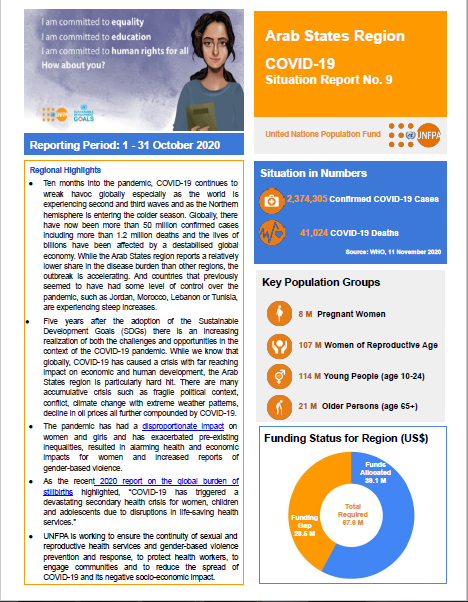
COVID-19 Situation Report No. 9
Ten months into the pandemic, COVID-19 continues to wreak havoc globally especially as the world is experiencing second and third waves and as the Northern hemisphere is entering the colder season. Globally, there have now been more than 50 million confirmed cases including more than 1.2 million deaths and the lives of billions have been affected by a destabilised global economy. While the Arab States region reports a relatively lower share in the disease burden than other regions, the outbreak is accelerating. And countries that previously seemed to have had some level of control over the pandemic, such as Jordan, Morocco, Lebanon or Tunisia, are experiencing steep increases.
Five years after the adoption of the Sustainable Development Goals (SDGs) there is an increasing realization of both the challenges and opportunities in the context of the COVID-19 pandemic. While we know that globally, COVID-19 has caused a crisis with far reaching impact on economic and human development, the Arab States region is particularly hard hit. There are many accumulative crisis such as fragile political context, conflict, climate change with extreme weather patterns, decline in oil prices all further compounded by COVID-19.
The pandemic has had a disproportionate impact on women and girls and has exacerbated pre-existing inequalities, resulted in alarming health and economic impacts for women and increased reports of gender-based violence.
As the recent 2020 report on the global burden of stillbirths highlighted, “COVID-19 has triggered a devastating secondary health crisis for women, children and adolescents due to disruptions in life-saving health services.”
UNFPA is working to ensure the continuity of sexual and reproductive health services and gender-based violence prevention and response, to protect health workers, to engage communities and to reduce the spread of COVID-19 and its negative socio-economic impact.
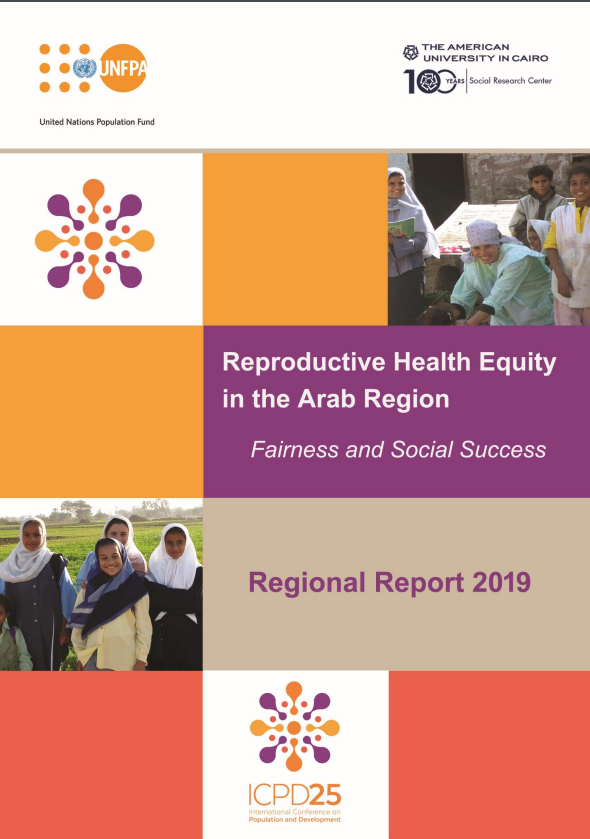
Reproductive Health Equity in the Arab Region
This report responds to the new International Conference on Population and Development (ICPD) beyond 2014 framework that places people’s well-being at the center and acknowledges their aspirations for dignity and human rights, adopts a rights based approach, and embraces equity and fairness. It is also anchored on the widely adopted Sustainable Development Goals (SDGs) and its pledge to “Leaving no one behind”. It addresses current regional concerns with sexual and reproductive health (SRH) and mainstreams an equity lens in SRH policies and actions.
The report is a product of the joint regional initiative on “Sexual and Reproductive Health Inequities” launched by the United Nations Population Fund for Arab States Regional Office (UNFPA/ASRO) during 2018 in partnership with the Social Research Center of the American University in Cairo (SRC/AUC). The initiative targets supporting governance and policy reforms to address sexual and reproductive health inequities.
The long-term objectives of the regional initiative are to contribute to
informed policy dialogue about effective and measurable health equity solutions;
supporting governments to form integrated multi-sectoral policies and programs that engage civil society and communities to address SRH inequities in the Arab region; and
reduction in sexual and reproductive health inequities.
The report draws mainly on national analytical reports of five countries in the region: Egypt, Jordan, Morocco, Oman and Sudan. These reports were prepared by independent researchers nominated or endorsed by partner institutions from each country. The partner institutions are: National Population Council in Egypt, Higher Population Council in Jordan, National Observatory for Human Development in Morocco, Ministry of Health in Oman, and National Population Council in Sudan.
The regional report is one component within the broader initiative of research and policy support. The report aims to provide an impetus for a research and capacity building movement that allows for the expansion of the investigation to invisible social groups and in-depth up-to-date findings, as well as the articulation of more detailed country specific policy and action plans.
This report uses available evidence to analyze and highlight the level and trend of SRH inequalities within different social groups, and traces these inequalities to the different forces shaping them. It proposes general action and policy recommendations to address reproductive health inequities.
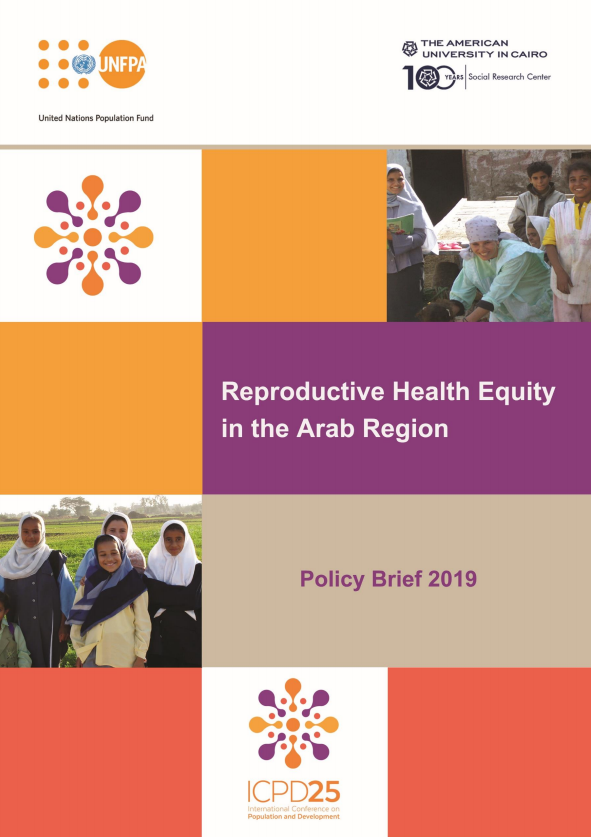
Reproductive Health Equity in the Arab Region: Policy Brief 2019
The time is right for the Arab region to embrace a policy movement towards eliminating the systematic unfair inequalities in sexual and reproductive health (SRH) as a core development goal and a whole of government performance indicator.
This movement is anchored on the three main pillars of the current development thinking. The first is the ambitious ICPD beyond 2014 framework1 that places people’s well-being at the center and acknowledges their aspirations for dignity and human rights, adopts a rights based approach, and embraces equity and fairness. The second is the social determinants of health (SDH) resolutions of the World Health Organization2 that call for health in all policies. The third is the widely adopted 2030 sustainable development goals (SDGs)3 and the pledge to “LEAVING NO ONE BEHIND”.
The converging development thinking makes an explicit link between the unequal distribution of health and wellbeing among social groups and the unfairness in three interlinked upstream and structural domains, namely governance, public policies, and social arrangements. It recognizes that the unfairness on these three fronts is a real threat to the cohesion and sustainability of the society. SRH holds a central place in this thinking.
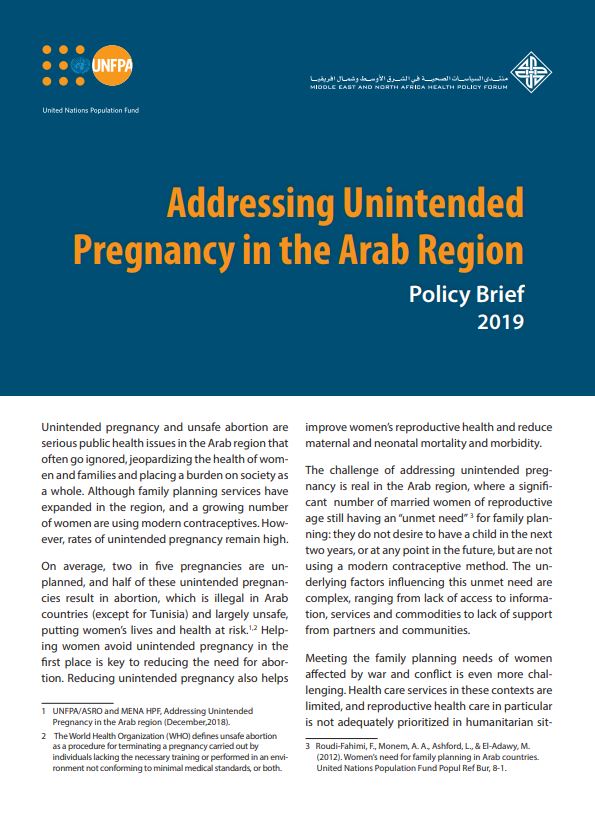
Addressing Unintended Pregnancy in the Arab Region Policy Brief 2019
Unintended pregnancy and unsafe abortion are serious public health issues in the Arab region that often go ignored, jeopardizing the health of women and families and placing a burden on society as a whole. Although family planning services have expanded in the region, and a growing number of women are using modern contraceptives. However, rates of unintended pregnancy remain high. On average, two in five pregnancies are unplanned, and half of these unintended pregnancies result in abortion, which is illegal in Arab countries (except for Tunisia) and largely unsafe, putting women’s lives and health at risk.
Helping women avoid unintended pregnancy in the first place is key to reducing the need for abortion. Reducing unintended pregnancy also helps improve women’s reproductive health and reduce maternal and neonatal mortality and morbidity.
The challenge of addressing unintended pregnancy is real in the Arab region, where a significant number of married women of reproductive age still having an “unmet need” for family planning:they do not desire to have a child in the next two years, or at any point in the future, but are not using a modern contraceptive method. The underlying factors influencing this unmet need are complex, ranging from lack of access to information, services and commodities to lack of support from partners and communities.
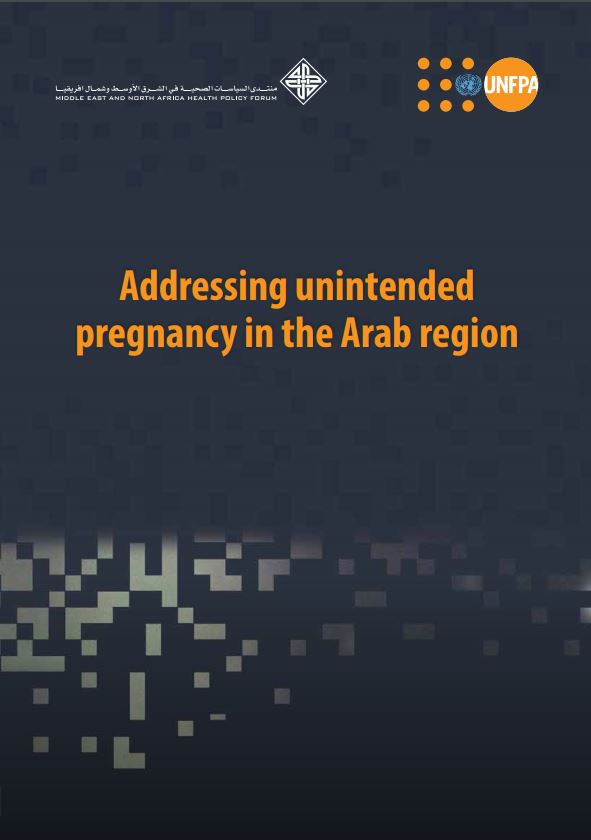
Addressing unintended pregnancy in the Arab region
Abortion continues to be a key contributor to maternal mortalities and morbidities in the Arab states region. With zero preventable maternal deaths and zero unmet need for family planning clearly articulated as strategic priorities of UNFPA at global, regional and national levels, UNFPA Arab States Regional Office (ASRO) in partnership with Middle East North Africa Health Policy Forum (MENA-HPF) launched this desk review and analysis that scanned available data and literature to analyze the situation of abortion-related legislations and practices, the magnitude of unsafe abortion and its root causes in the Arab states region.
The analysis looks at the consequences of unsafe abortion, attempts to address the challenges related to unsafe abortion and the necessity of fulfilling women’s and adolescents’ right to accessing family planning information and services as an effective measure to preventing the recourse to abortion and reducing subsequent mortalities and morbidities. The analysis highlights that respecting women's rights particularly in accessing quality reproductive health and family planning information and services is an effective measure to curb the burden of disease and mortalities related to unsafe abortion as well as a plethora of other contributors to maternal mortalities.

EVOLUTION OF GENDER-BASED VIOLENCE AND SEXUAL AND REPRODUCTIVE HEALTH SERVICES WITHIN THE SYRIA CRISIS RESPONSE
The conflict in Syria has generated one of the most severe and protracted humanitarian crises ever faced. Now into its 10th year, over 5.5 million refugees are still registered1 in five neighbouring countries and over six million people are currently displaced within Syria. This represents the largest displacement of population in the world.
UNFPA is ensuring the overall coordination and harmonisation of the Syria Crisis Response through the UNFPA Regional Syria Crisis Response Hub (the Hub) of the Arab States Regional Office (ASRO) based in Amman, Jordan. In the context of the crisis response, the UNFPA Regional Priorities are aligned with the Strategic Plan and reflected in the Protection and Health Chapters of the Regional Refugee and Resilience Plan (3RP), the inter-agency plan designed to coordinate and support the efforts of the five refugee hosting countries, as well as in the Syria Humanitarian Response Plan (HRP) that covers Syria and cross-border operations into Syria. The relevant overall objectives are the following:
To prevent and respond to gender-based violence;
Strengthening Reproductive Health services in impacted areas.
In order to gain a better understand and capture what has worked in the gender-based violence and sexual and reproductive health responses in the region, the UNFPA the Regional Syria Response Hub has commissioned an analysis of the evolution of the gender-based violence and sexual and reproductive health services over the past three years (2017-2020), whose methodology, main findings, recommendations, and points of advocacy are the object of this report. This report captures the main finding of this analysis and highlights interesting responses and initiatives. Based on these a set of programme and policy recommendations are made to inform future gender-based violence and sexual and reproductive health programmes.
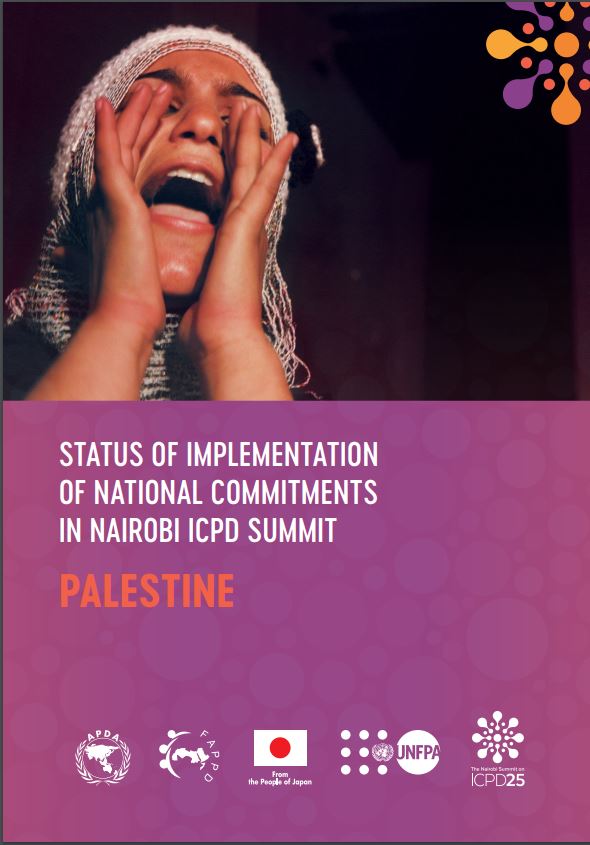
STATUS OF IMPLEMENTATION OF NATIONAL COMMITMENTS IN NAIROBI ICPD SUMMIT- PALESTINE
Starting in 2017, the Asian Population and Development Association (APDA) and the Forum of Arab Parliamentarians on Population and Development (FAPPD), with support from UNFPA Arab States Regional Office (ASRO), have organized a series of the Arab and Asian Parliamentarians’ Projects on Population and Development in Arab countries, which have seen significant progress in parliamentarians’ commitments to population and development issues and triggered successful developments in inter-regional/regional networking and partnerships.
Building on Nairobi Summit and strengthening inter-regional/regional networking and partnerships for concrete actions to address Nairobi Commitments at the National level, a pilot study that was conducted in the selected Asian and African Countries in the region Morocco and Palestine, Sri Lanka and Lao PDR to address challenges and gaps required for the implementation of the commitments in addition to the required recommendations "To accelerate The Promise"
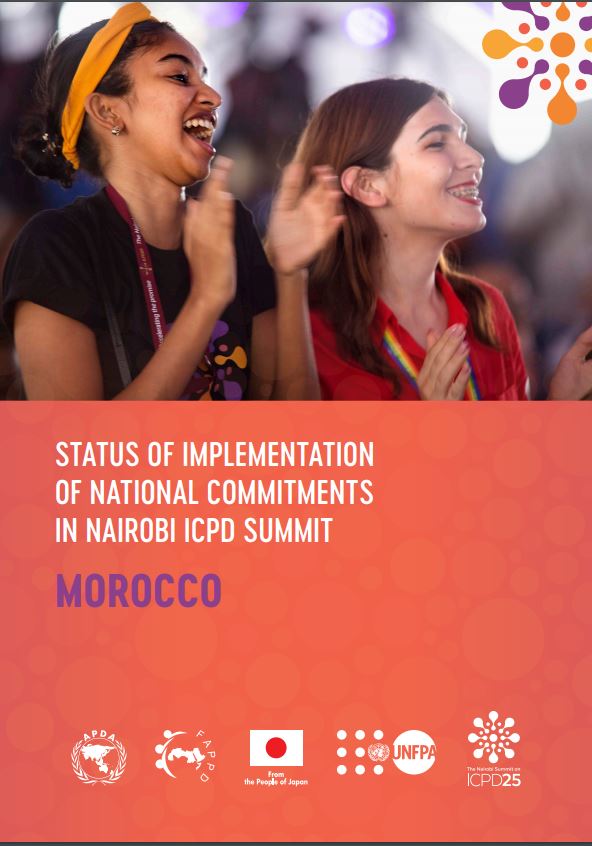
STATUS OF IMPLEMENTATION OF NATIONAL COMMITMENTS IN NAIROBI ICPD SUMMIT MOROCCO
Starting in 2017, the Asian Population and Development Association (APDA) and the Forum of Arab Parliamentarians on Population and Development (FAPPD), with support from UNFPA Arab States Regional Office (ASRO), have organized a series of the Arab and Asian Parliamentarians’ Projects on Population and Development in Arab countries, which have seen significant progress in parliamentarians’ commitments to population and development issues and triggered successful developments in inter-regional/regional networking and partnerships.
Building on Nairobi Summit and strengthening inter-regional/regional networking and partnerships for concrete actions to address Nairobi Commitments at the National level, a pilot study that was conducted in the selected Asian and African Countries in the region Morocco and Palestine, Sri Lanka and Lao PDR to address challenges and gaps required for the implementation of the commitments in addition to the required recommendations "To accelerate The Promise"
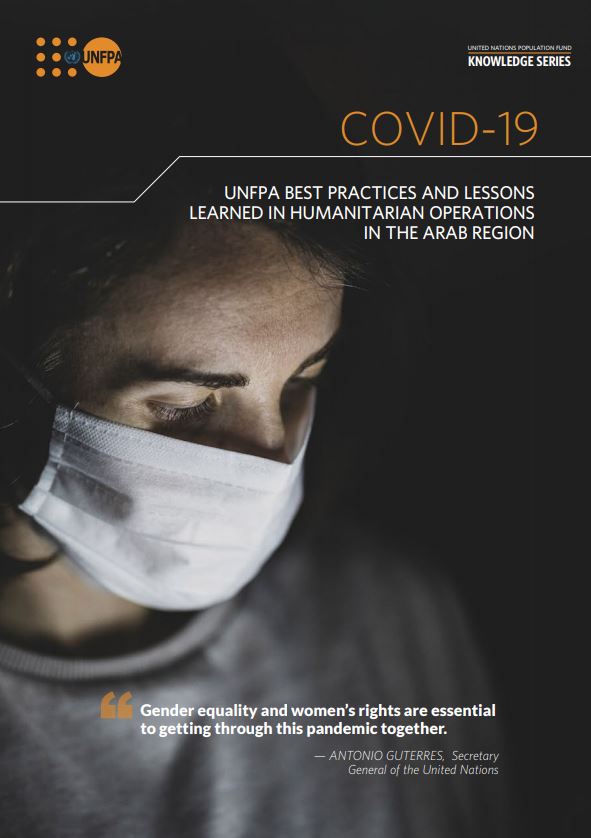
COVID-19: UNFPA Best Practices and Lessons Learned in Humanitarian Operations in Arab Region
The COVID-19 pandemic continues to redefine the realities of nations throughout the world, creating new and unprecedented challenges. The pandemic and its long-term ramifications have revealed many of the structural issues that underlie societies, highlighting systemic inequalities across race, gender, socioeconomic status, and others. In humanitarian contexts, the pandemic has exacerbated the challenges already impacting communities in need, be it through health risks, the economic fallout, or on human rights and social harmony.
This is especially true for women and girls who, as is the case with most humanitarian crises, continue to bear the brunt of the pandemic. In addition to being at higher risk of contracting the virus due to shouldering a larger portion of frontline response and caretaking responsibilities, women and girls continue to face higher risks of gender-based violence, which have been significantly heightened in light of the pandemic and its consequences. The web of violence besetting them has only expanded; movement restrictions have meant that more women and girls will face even greater difficulties accessing basic sexual and reproductive health services, while those suffering violence at home are no longer able to escape their abusers. Meanwhile, the socioeconomic fallouts have heightened the risks of exploitation and negative coping mechanisms like child and forced marriage. Additionally, as governments shift resources away from development and towards pandemic response, investments in challenging social norms that stifle the rights of women and girls will become even less of a priority, and threatens the progress achieved in past years.
Since the onset of the pandemic, UNFPA has been aware of these risks and challenges, and has made significant changes to its programmes to ensure they are being addressed. UNFPA offices throughout the Arab states region have continued to focus on innovations and alternative solutions that guarantee the continuity of services to those in need, maintaining safe access to health facilities that provide sexual and reproductive health services while tailoring programmes to allow for continued support to survivors of gender-based violence. This document captures some of these efforts, outlining the lessons learned and offering a simple blueprint that can be replicated in other contexts.
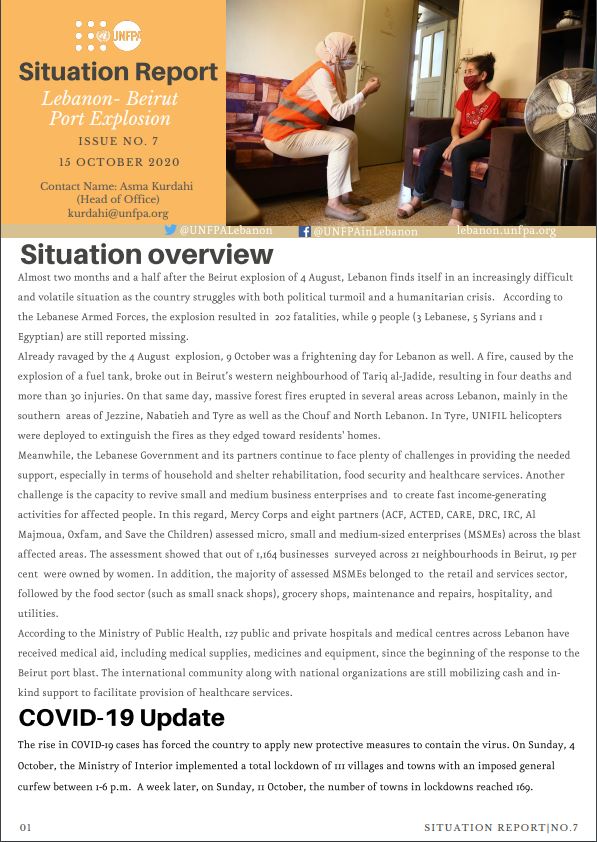
Beirut Explosion Situation Report No.7
Almost two months and a half after the Beirut explosion of 4 August, Lebanon finds itself in an increasingly difficult and volatile situation as the country struggles with both political turmoil and a humanitarian crisis. According to the Lebanese Armed Forces, the explosion resulted in 202 fatalities, while 9 people (3 Lebanese, 5 Syrians and 1 Egyptian) are still reported missing.
Already ravaged by the 4 August explosion, 9 October was a frightening day for Lebanon as well. A fire, caused by the explosion of a fuel tank, broke out in Beirut’s western neighbourhood of Tariq al-Jadide, resulting in four deaths and more than 30 injuries. On that same day, massive forest fires erupted in several areas across Lebanon, mainly in the southern areas of Jezzine, Nabatieh and Tyre as well as the Chouf and North Lebanon. In Tyre, UNIFIL helicopters were deployed to extinguish the fires as they edged toward residents' homes.
Meanwhile, the Lebanese Government and its partners continue to face plenty of challenges in providing the needed support, especially in terms of household and shelter rehabilitation, food security and healthcare services. Another challenge is the capacity to revive small and medium business enterprises and to create fast income-generating activities for affected people. In this regard, Mercy Corps and eight partners (ACF, ACTED, CARE, DRC, IRC, Al Majmoua, Oxfam, and Save the Children) assessed micro, small and medium-sized enterprises (MSMEs) across the blast affected areas. The assessment showed that out of 1,164 businesses surveyed across 21 neighbourhoods in Beirut, 19 per cent were owned by women. In addition, the majority of assessed MSMEs belonged to the retail and services sector, followed by the food sector (such as small snack shops), grocery shops, maintenance and repairs, hospitality, and utilities.
According to the Ministry of Public Health, 127 public and private hospitals and medical centres across Lebanon have received medical aid, including medical supplies, medicines and equipment, since the beginning of the response to the Beirut port blast. The international community along with national organizations are still mobilizing cash and in-kind support to facilitate provision of healthcare services.